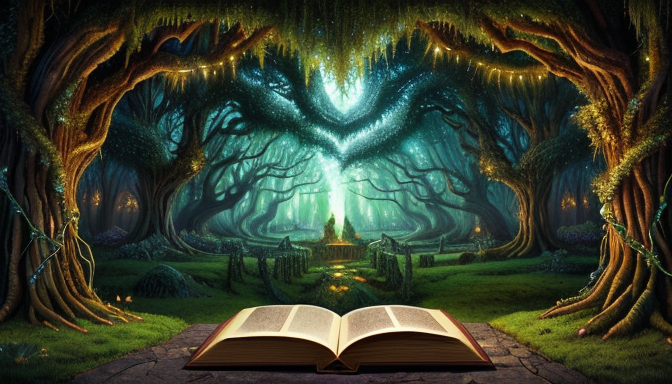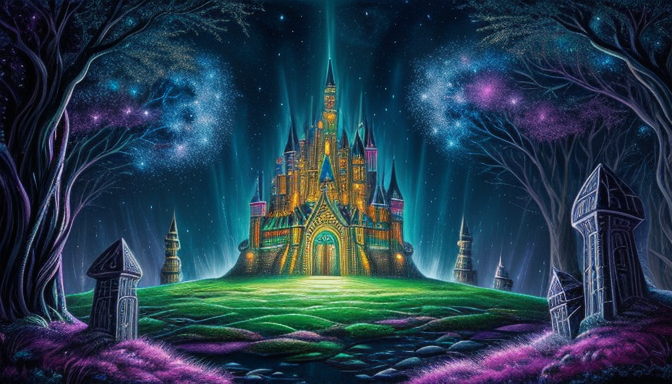When we think of fantasy literature, our minds often drift to the enchanting realms that have captured the hearts of readers for generations. These worlds, rich with imagination and intrigue, have not only entertained us but have also profoundly influenced the landscape of modern storytelling. Take, for instance, the iconic universe of Dungeons & Dragons. Born in the 1970s, this role-playing game opened the floodgates to a plethora of creative possibilities, allowing players to craft their own adventures in a world filled with dragons, wizards, and epic quests. The intricate lore and world mechanics developed here laid the groundwork for countless novels and games that followed.
Another legendary universe, the Forgotten Realms, has become a cornerstone of fantasy literature. With its richly detailed settings and diverse characters, this world has not only provided a backdrop for thrilling tales but has also served as a canvas for profound themes of heroism, sacrifice, and the eternal struggle between good and evil. Similarly, the Warhammer universe, with its grimdark aesthetic, has redefined the boundaries of fantasy, introducing a level of complexity and moral ambiguity that challenges traditional narratives.
These worlds are more than just settings; they are living entities that evolve with each new story, each new character. They invite us to explore the unknown and question our realities. So, what is it about these fantasy realms that continues to draw us in? Perhaps it’s the magic of escape or the thrill of adventure that keeps our imaginations alive. As we delve deeper into these captivating universes, we uncover not just tales of fantasy, but reflections of our own lives and struggles.
The Birth of Iconic Fantasy Realms
Fantasy worlds have always held a special place in our hearts, acting as gateways to realms where the impossible becomes possible. Among these, Dungeons & Dragons stands out as a revolutionary platform that not only introduced players to immersive storytelling but also provided a framework for countless other fantasy universes. Imagine rolling dice to determine your fate in a world filled with dragons, wizards, and epic quests—this is where the magic truly begins!
Another significant universe is the Forgotten Realms, a richly detailed setting that has captivated fans since its inception. With its intricate lore, diverse cultures, and complex histories, the Forgotten Realms is a tapestry woven from the threads of mythology and imagination. It’s a place where heroes rise, villains plot, and adventures unfold in every corner. This realm invites readers and players to explore its vast landscapes, from the bustling streets of Waterdeep to the mysterious depths of Undermountain.
Then there’s Warhammer, a universe steeped in dark fantasy and relentless conflict. Unlike the more whimsical tones of other fantasy worlds, Warhammer presents a grim reality where survival is a constant struggle against overwhelming odds. Its lore is a rich blend of science fiction and fantasy, featuring epic battles and a deep moral complexity. The intricate mechanics of this universe have influenced not just gaming but also literature, inspiring authors to delve into themes of heroism, sacrifice, and the nature of evil.
These iconic realms have not only shaped the fantasy genre but have also left an indelible mark on literature as a whole. They remind us that every story is a journey, and every journey begins with a single step into the unknown.

Evolution of Fantasy Literature
The is a thrilling journey, rich with imagination and creativity that has shaped the genre into what we know today. From the early days of folklore to the expansive universes of modern gaming, fantasy has transformed dramatically, captivating audiences across generations. One cannot discuss this evolution without mentioning iconic worlds like Dungeons & Dragons, Forgotten Realms, and Warhammer. These universes are not just settings; they are intricate tapestries woven with deep lore and complex mechanics that invite players and readers alike to immerse themselves fully.
Take Dungeons & Dragons, for instance. Launched in the 1970s, it revolutionized the way we perceive storytelling in games, allowing players to create their own narratives within a framework of rules. The Forgotten Realms setting, developed by Ed Greenwood, is a prime example of a fantasy world that combines rich history with a diverse array of characters and cultures. It’s a place where every corner holds a story waiting to be uncovered, making it a favorite for both gamers and novelists.
Similarly, Warhammer has crafted a universe that is as dark as it is detailed, pushing the boundaries of fantasy into the realms of horror and epic conflict. The lore behind Warhammer is so extensive that it often feels like a living entity, constantly evolving with each new addition to its expansive narrative. This evolution reflects a broader trend in fantasy literature, where the lines between games, novels, and films blur, creating a rich, interconnected web of storytelling.
In summary, the evolution of fantasy literature is a testament to the power of imagination. It invites us to explore realms beyond our own, igniting our creativity and challenging our perceptions of reality.
Frequently Asked Questions
- What defines a fantasy world?
A fantasy world is typically characterized by magical elements, mythical creatures, and unique settings that transport readers to realms beyond reality. It’s like stepping into a vibrant dream where anything is possible!
- How have fantasy worlds influenced modern literature?
Fantasy worlds have opened up new avenues for storytelling, inspiring countless authors to explore themes of heroism, adventure, and morality. Think of it as a treasure chest of creativity that keeps giving!
- Who are some key authors in the fantasy genre?
Some of the giants in fantasy literature include J.R.R. Tolkien, C.S. Lewis, and J.K. Rowling. Each has crafted worlds that resonate with readers, much like a favorite song that sticks with you long after you’ve heard it!
- Why do readers gravitate towards fantasy literature?
Readers are drawn to fantasy for its escapism and the chance to experience adventures that are impossible in the real world. It’s like a magical portal that allows you to live out your wildest dreams!

Recent Comments